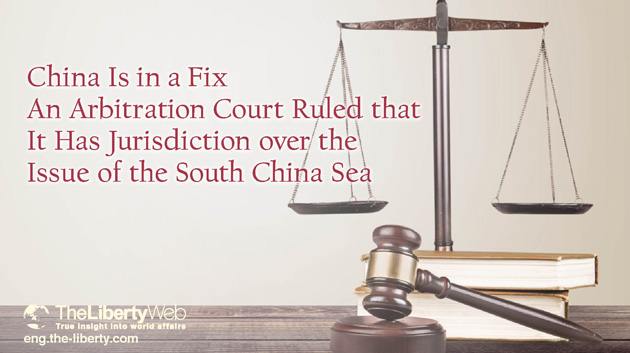China Is in a Fix : An Arbitration Court Ruled that It Has Jurisdiction over the Issue of the South China Sea
The Philippine government filed an international arbitration case in 2013 over China’s territorial claims in the South China Sea. On October 29th of this year, the Permanent Court of Arbitration (PCA), located in The Hague, Netherlands, ruled that it had authority to hear some territorial claims that the Philippines had filed against China. It dismissed Beijing’s objection, and decided to start full-fledged hearings.
The PCA will proceed with hearings on seven of Manila’s submissions, especially on whether Scarborough Shoal and the low-tide areas where China is reclaiming land can be considered islands, and whether China has interfered with Philippine fishing activities.
A spokesperson for the Philippine Foreign Ministry said that the Philippine government welcomed PCA’s decision. On the other hand, a Chinese Foreign Ministry spokesperson sharply reacted against the ruling, saying, “China will not participate in the proceedings. The decision is null and void, and has no binding effect on China.”
China Objects to Having Discussions on a Level Playing Field
The reason that China is boycotting the proceedings is that it knows that it will definitely lose in open and fair discussions. In other words, China is well aware that it is making unjustified claims.
Looking back, China did not want to discuss the issues openly and publicly, but insisted that they be solved between the parties concerned, intimidating other nations under the surface to push its claims through. China has been behaving like a gangster.
For example, since about 2012, the U.S. has been calling on Southeast Asian countries and China to establish a code of conduct, an international legal framework for resolving possible disputes in the South China Sea. However, China has been reacting sharply, insisting that such disputes be solved between the involved parties.
The summit of leaders of the Association of Southeast Asian Nations (ASEAN) that was held last year failed to adopt a code of conduct for fear of provoking China. The ASEAN meetings to be held in mid-November of this year will focus on formulating this code of conduct.
China Continues to Extort and to Squeeze Japan
The same is true of conflicts between Japan and China. In April of 2014, Chinese authorities seized a Mitsui O.S.K ship because the company refused to pay court-ordered, wartime compensations. Before the Sino-Japanese war, Mitsui O.S.K’s predecessor chartered two freighters from a Chinese ship owner, but the two ships were later lost at sea during the war. An heir of the Chinese ship company’s president sued seeking compensation for the damages and decades of lease fees, and Mitsui lost the case.
The court decision was extremely one-sided. One can never expect a fair trial in a law court of a one-party dictatorship like China.
On October 10th of this year, UNESCO added documents about the Nanking Massacre to its Memory of the World Register. Taking advantage of the screening process that took place in concealment and secrecy, China lobbied behind the scenes, successfully fabricating history.
The International Community Must Think More about “Global Justice”
Master Ryuho Okawa, founder and CEO of the Happy Science group, pointed out the nature of light and darkness as follows:
Those who know light can clearly recognize darkness and see through the evil nature of others who are in the wrong. From the standpoint of the wicked, their true nature is revealed. It is all right so long as they are in hiding, but once their true nature is revealed, they have to run away. For example, you do not have to worry about a cockroach as long as it is hiding under the refrigerator. But the moment you see it scurry around in a brightly lit place, you will think you cannot sleep with an easy mind until you get rid of it.
Japan is now in a situation where a lot of cockroaches scuttle around it. And yet, it is turning a blind eye to the situation, thinking that nothing is more important than peace.
When it comes to a country like China that is plainly wrong, we must make a clear distinction about who is right or wrong, preventing such a country from doing bad things. In the international community driven by economic power and military might, Japan must keep asking what global justice is.



















